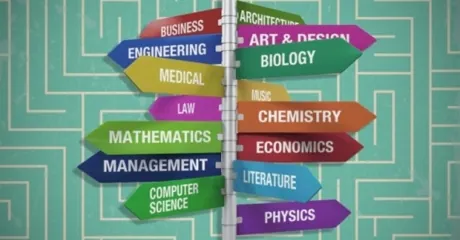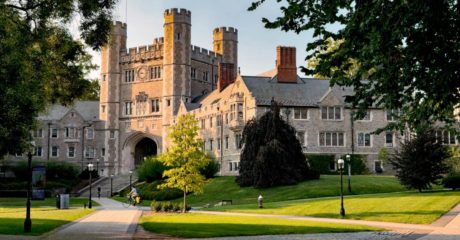The Haslam College of Business at the University of Tennessee Knoxville landed at No. 35 in this year’s 2023 rankings, up an incredible 14 places from last year’s No. 49 for the Class of 2022.
The B-School has become increasingly more selective, with an average acceptance rate of 39% for the most recent incoming class in contrast to 72.83% for last year’s incoming class – the largest jump in acceptance rate we have seen in any school’s year-over-year rankings. SAT scores have been increasing over the years as well, with this year’s class scoring an average of 1275 – up five points from last year’s 1270.
Employment-wise, Haslam saw a slight decrease from last year’s 94.44% for the Class of 2022 securing full-time employment at the time of graduation to 90.79% for the Class of 2023. Internship outcomes saw a slight increase, with 83% of ‘23 grads landing a business-focused internship before graduating, compared to 79.50% for ‘22 grads.
The Haslam experience is designed around an integrated education with a strong emphasis on global leadership development and real-world learning. Haslam’s highest finish of all the three methodological categories was in the Academic Experience category, where they placed 26th.
INTEGRATED EDUCATION
Haslam undergraduates can choose from the following business majors: Accounting, Business Analytics, Economics, Finance, Human Resource Management, Management, Marketing, Public Administration, and Supply Chain Management.
Where Haslam really shines, however, is its integrated program offerings. The B-school recently partnered with the Tickle College of Engineering to offer the Heath Integrated Business and Engineering Program, a three-year program that allows students to graduate with a special concentration. The integrated program features a number of cohort-based projects and unique extracurricular activities such as an Executive Mentor Program and company site visits to organizations such as Oak Ridge National Laboratories and Amazon Fulfillment Center.
For those interested in government and nonprofit enterprises, the Public Administration program combines a general business education with specific courses in the economic and political aspects of government policies. Students can choose electives to focus their expertise on.
Haslam alumni view their education relatively well. Graduates rated the quality of teaching in Haslam courses at an 8.86 average. When asked if they would recommend the Haslam business program to a close friend or colleague interested in an undergraduate business degree, alumni gave a strong 9.59 average rating.
GLOBAL LEADERSHIP SCHOLARS
The Greg and Lisa Smith Global Leadership Scholars (GLS) is the official honors program at Haslam. GLS students pursue a collateral or concentration in international business with whichever business major they declare. The GLS curriculum consists of honors courses and a set of leadership training seminars in their second, third, and fourth years. One of the biggest benefits of the program is the access that students have to strong mentorship.
Additionally, the global component allows students to travel and intern in London.
“As part of the GLS program, we spent a semester in London, where I interned with a company called Michael Page,” another 2018 alumni said. “I learned a lot about how the major I had chosen could lead to a certain career path and how to be a business professional. The experiences I learned helped me realize I wanted to change my major to accounting and how to excel in my future internships.”
The GLS program is a prime example of the strong leadership development at Haslam. Students are not only given direct leadership training and mentorship through seminars but are also exposed to the global component of leadership through the London internship. In turn, Haslam students are taught to lead with a solid understanding of global business.
REAL-WORLD CAPSTONE
Haslam’s senior capstone experience brings together the cumulative business education into one project. Student teams take part in a business simulation and run a business throughout the semester. The capstone experience simulates what working in the real world is like as students are challenged to collaborate and overcome differences to effectively run their business.
The focus on collaboration and teamwork is a key component of what makes the Haslam capstone experience valuable. By bringing together students from different majors and backgrounds, Haslam creates a real-world experience where each team member brings their strengths to the table and works with others to achieve a common goal.
With strong integrated education opportunities, global leadership development, and a real-world capstone experience, Haslam students are equipped with a well-rounded education that very much prepares them for post-grad opportunities.
Alumni say:
“In our senior capstone course, we were required to be a part of a business simulation where a group of students from different majors “ran a business” throughout the semester. It was challenging/exciting to get to work with different students outside your major and collaborate on business decisions. I was able to improve my problem solving and communication skills through teamwork instead of writing a thesis.”
“Business students were required to take a project-based capstone class senior year. We ran our own virtual business as a team of 5, and there was very little overlap of majors on the team. Each teammate had their own strengths to bring to the table and it was really neat to see what our 4 years of learning had taught all of us.”
“My education in the business program prepared me for real world business problems and opportunities that were relevant to my desired industry. I even got the opportunity to work with employers on real world supply chain constraints, designing solutions for cost effective strategies to improve critical business needs.”
“I was involved in a capstone business project encompassing the full scope of a startup bike business (manufacturing, marketing, sales, accounting) and it helped prepare me for real world experiences. I continue to think back on the project with challenges I face today.”
“I was able to study abroad and intern abroad. Also, I was able to do a cross-department thesis that helped connect dots of different subjects.”










